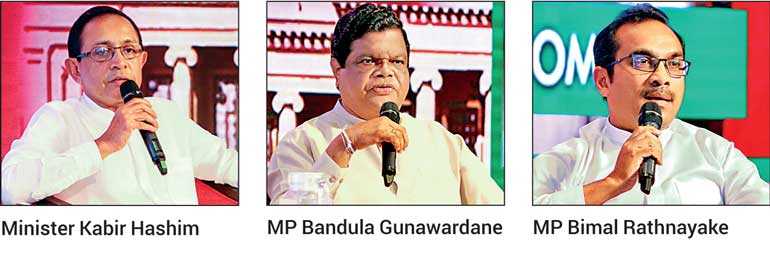Friday Feb 27, 2026
Friday Feb 27, 2026
Thursday, 19 September 2019 02:04 - - {{hitsCtrl.values.hits}}

Economic Summit wraps up with reps of presidential candidates giving policy views
Different views expressed on SOE reform, anti-corruption, fiscal consolidation
Hashim defends Govt. policies, says they are continuance good for SL
Bandula positive about leadership abilities of GR
JVP outlines best practices to improve governance
By Uditha Jayasinghe
Leadership is crucial to provide answers to many of Sri Lanka’s governance and growth issues, noted representatives of three presidential candidates yesterday who acknowledged the role political will would have to play in reforming State Owned Enterprises (SOEs), improve anti-corruption measures and continue with the fiscal consolidation program.
Speaking at the final session of the Sri Lanka Economic Summit 2019, titled ‘Recalibrating Sri Lanka’s Economic Trajectory: Towards 2025’, organised by the Ceylon Chamber of Commerce (CCC), United National Party (UNP) Chairman and Highways, Road Development and Petroleum Resources Minister Kabir Hashim, United People’s Freedom Party MP Bandula Gunawardane and Janatha Vimukthi Peramuna (JVP) MP Bimal Rathnayake, attempted to outline the policies of the respective presidential candidates and what they may focus on if they are elected to power.
All three agreed that reforms were needed to foster growth and that changes needed to take place in the public service, SOEs, fiscal management, taxes, and governance to ensure better policy making, anti-corruption measures, environmental protection and promote growth.
However, the three parties deferred significantly on how these reforms should be carried out with Hashim supporting the steps that have been taken by the Government so far and advocating for a stronger mandate at the next elections to complete the policies that have already been started.
“We have taken legislative and other steps to improve governance and strengthen institutions. The Judiciary is more independent now and the Government worked to stabilise the economy after coming to power. There were also attempts to understand the strategic importance of projects and focus on them, rather than simply following an earlier plan.
For example, this was why we decided to start the central expressway, rather than complete the third stage of the Hambantota highway because we understood the economic imperatives behind it. The Government also started a range of reforms, which focused on opening up Sri Lanka to the world and making the economy more competitive.”
Gunawardena responding to a range of questions stressed that good leadership alone could cut down on corruption. Recalling his experience as the former Education Minister he pointed out that establishing labs and upgrading school facilities countrywide was brought to a successful conclusion with no delays and accusations of corruption because they were carried out responsibly. He argued that if Rajapaksa becomes President the necessary leadership would be provided to ensure that development takes place seamlessly.
“What we have come to understand is the importance of good leadership. If the right direction is given from the top there will be action from other quarters. I have experienced this first hand. If public servants know that they are being supported, then they will carry out their duties.”
Ratnayake argued that while the responsibility of good leadership lay with politicians that alone was not sufficient to counter corruption. The parliamentarian emphasised on the importance of credible appointments, getting institutions to conduct themselves independently, proper financial management, data focused policymaking and streamlined departments as essential components in fighting corruption.
“We have seen that when a politician is given the Ports Ministry his brother becomes the head of the Sri Lanka Ports Authority. This sort of thing should not happen. When a Minister is accused of corruption he is just transferred to another Ministry whereas the right thing is for him to be removed. We have seen Cabinet Ministries being broken up and divided among several Ministers resulting in worse governance. Such things need to stop.
“We have already clearly stated that under the JVP there would only be 30 Cabinet Ministries and they will have set departments and subsidiary institutions. We need to have independent law enforcement and honest public servants need to be given the space to work. That is how we can move forward.”